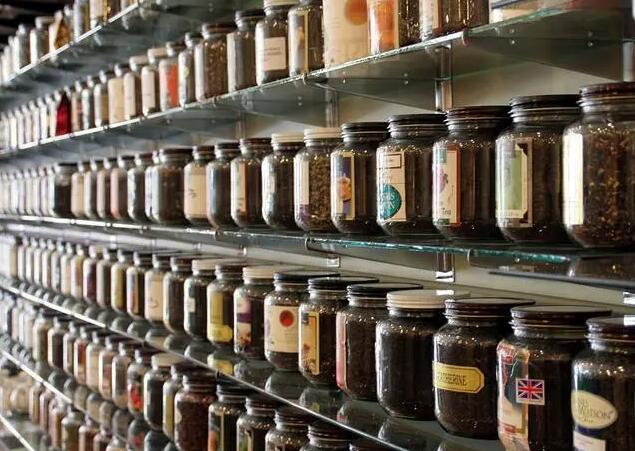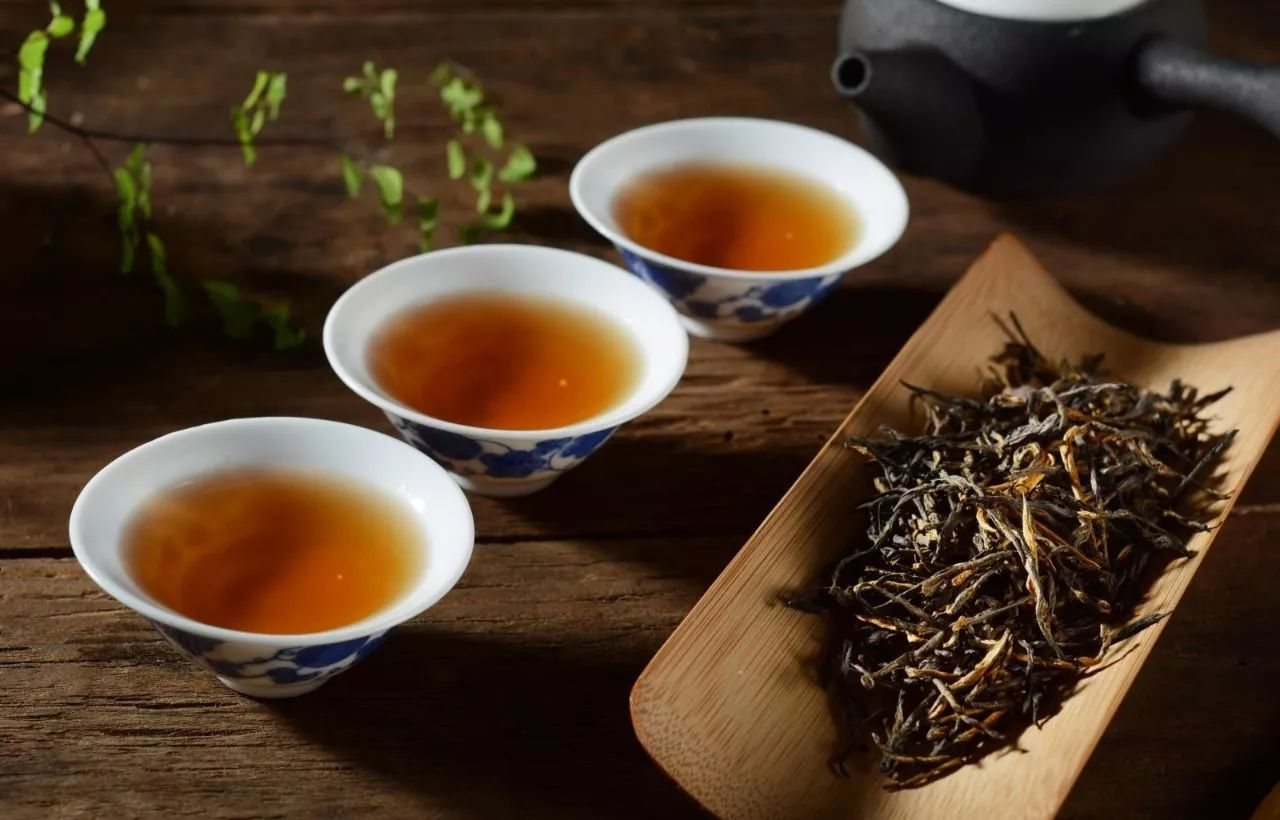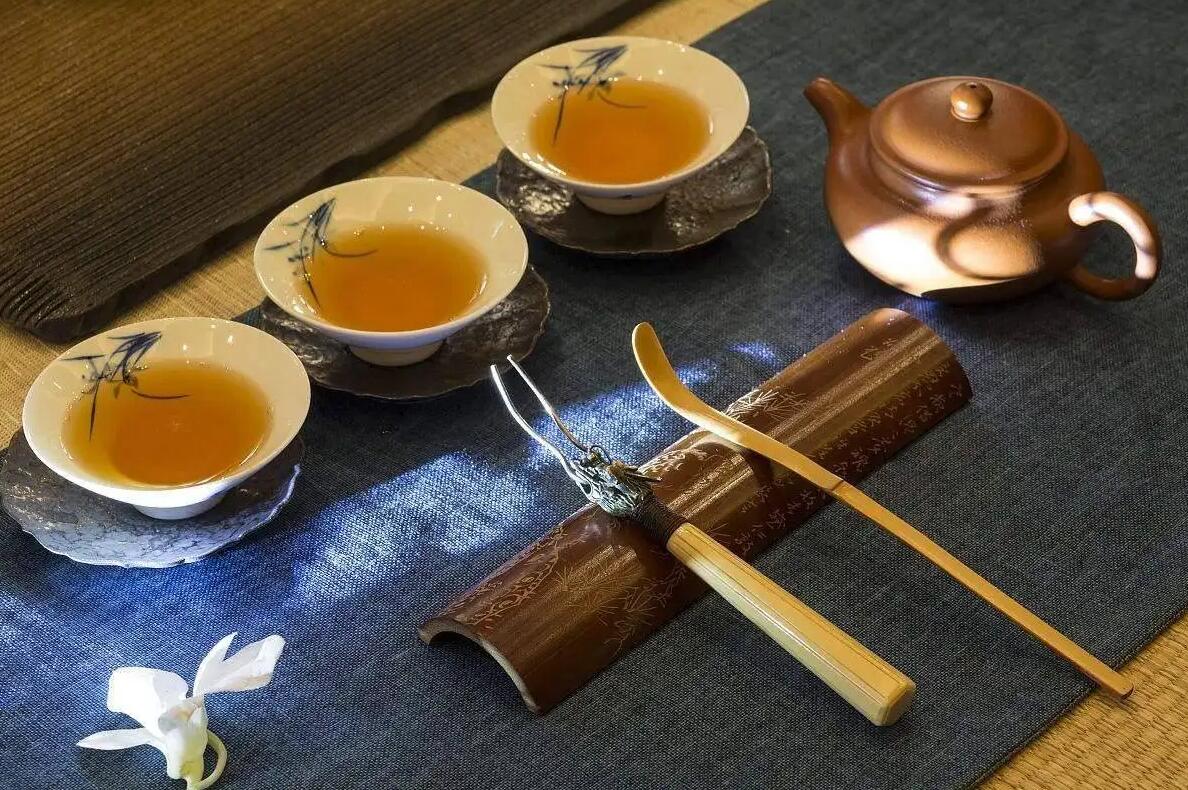1. What are the chemical components of tea?
Over 700 different chemical compounds have been identified in tea. Fresh tea leaves harvested from tea plants contain 75%-78% moisture, and the rest 22%-25% dry masses consist of organic and inorganic components. Organic components mainly include the following (dry weight): 20%-30% of protein, 20%-25% of saccharide, 10%-25% of tea polyphenols, about 8% of lipids, 3%-5% of alkaloids, 2%-7% of free amino acids, about 3% of organic acids, about 1% of pigments, 0.6%-1.0% of vitamins, and 0.005%-0.03% of aromatic substances.
2. What are the effects of tea?
Research has shown that tea has 23 main effects: quenching thirst; relieving fatigue; relieving tension; strengthening heart; diuretic; preventing and lowering high blood pressure; preventing and lowering hyperglycaemia; protecting the liver; facilitating bowel movement; relieving greasy taste; combining to detoxify heavy metals (such as lead, arsenic); antibacterial activity; diminishing inflammation; antiviral; preventing gastrointestinal cancer, breast cancer, prostate cancer and lung cancer; antioxidant; anti-radiation; preventing dental caries; relieving hangover; preventing ophthalmic diseases; preventing calculus; preventing atherosclerosis; and preventing neurodegeneration.
3. What are the effects of tea polyphenols?
The main effects of tea polyphenols include: effectively enhancing functions of blood capillary, toughness of microvascular walls; facilitating the absorption of vitamin C and prevent scorbutus; detoxifying harmful metals to certain extent (such as reducing toxic hexavalent chromium ions to non-toxic ions); inhibiting atherosclerosis, and reducing the incidence of hypertension and coronary heart disease; having significant antibacterial and bactericidal effect; relieving hyperthyreosis; relieving anti-radiation damage and increasing the total number of white blood cells; inhibiting mutation and cancer cell generation; preventing peroxidation of intracellular lipid and significantly inhibit the formation of free radicals; having anti-coagulation and stasis removing effect, lowering blood lipids, preventing thrombosis from forming, and helping to lose weight; preventing neurodegenerative disorders and Alzheimer's disease; preventing ultraviolet rays' irradiation damage to the skin; and enhancing human immunity.
4. What are the effects of alkaloids in tea on the human body?
There are two main types of alkaloids in tea, namely caffeine and theobromine. Two alkaloids are methylpurine compounds, which are important physiologically active substances and distinctive chemical substances in tea. They can significantly excite the central nervous system and have a diuretic effect. They are all capable of exciting the central nervous system. The alkaloid with the highest content in tea is caffeine,followed by theobromine.
5. What are the beneficial effects of theanine in tea on human body?
Theanine accounts for about half of the total free amino acids in tea, and is an important component of tea, especially closely related to the quality of green tea. Theanine has the following effects: enhancement of memory and learning ability; prevention of Parkinson's disease,Alzheimer's disease and conduction nervous disorder; protection of the liver; reduction of blood pressure, tranquilization of the mind, and improvement of sleep; enhancement of immune function and delay aging.
6. What are the effects of ϒ-aminobutyric acid in tea on human body?
ϒ-aminobutyric acid is a non-protein amino acid in plants and animals. Generally, the content of ϒ-aminobutyric acid in tea is very low, but it can be significantly increased by special processing techniques.
ϒ-aminobutyric acid has significant effects on human health,such as lowering blood pressure, improving brain cell metabolism, and enhancing memory. It is reported that ϒ-aminobutyric acid can improve vision, lower cholesterol, regulate hormone secretion, relieve ammonia toxicity, protect the liver, and enhance liver function.
7. Does drinking tea improve dental health?
Tea has fluorine content, which can be utilized for improving dental health by drinking tea by Chinese tea cup. Therefore,drinking tea in moderation is a reliable and effective method to prevent caries. Children under the age of 6 are in the period of permanent tooth germ formation. During this period, fluoride intake is beneficial for preventing caries. To this end, children can rinse their mouths with tea. The bactericidal effect of phenolics in tea can also improve the health of teeth.
8. Does tea have an antioxidant effect?
Tea has an excellent antioxidant activity, which is one of the critical features of its health benefits. The antioxidant effect of tea is closely related to its function of scavenging free radicals. There are many components in tea that can scavenge free radicals. The most important one among them is tea polyphenols. The three major mechanisms of tea polyphenols' antioxidant function are to inhibit the production of free radicals, to directly scavenge free radicals, and to activate the free radical scavenging system of the organism itself.
9. Is drinking tea helpful for cancer prevention?
Tea has a certain effect on cancer prevention. A large number of animals and population intervention studies have shown that regular and continuous drinking a certain amount of green tea can effectively prevent certain cancers. This is especially true for the prevention of digestive tract cancer, breast cancer, and prostate cancer. Its preventive effect on liver cancer is relatively good. Take digestive tract cancer as an example. Active ingredients from tea drinking widely are distributed in the digestive tract and metabolic organs, thereby inhibiting the absorption of carcinogens and promoting the apoptosis of tumor cells. The anti-cancer effect of tea is mainly ascribed to tea polyphenols, which can prevent cancer by inhibiting carcinogens (such as nitroso compounds), scavenging free radicals, blocking or inhibiting the growth of tumor cells, and promoting apoptosis of tumor cells. At present, a large number of epidemiological survey data show a better effect of tea in preventing cancer, especially in females. According to the study, the effect is counteracted somewhat by some bad habits such as smoking in males. In addition, tea is also rich in vitamin C and vitamin E, which can also help to prevent cancer.
10. Is drinking tea helpful for losing weight?
Population survey and intervention studies found that tea is good for lipid-lowering, but it does not have an obvious effect on losing weight. Drinking tea regularly can significantly improve the property of blood lipid and reduce cholesterol and triglyceride levels in the blood. In China, there are ancient records about tea's effect on losing weight,such as "good for losing weight", "dissolving oil", "frequent and long-lasting tea drinking making thinner", and so on. The lipid-lowering effect of tea is due to the comprehensive functions of various active ingredients (tea polyphenols, caffeine, vitamins, amino acids, etc.). The reason for obesity is that the absorption and synthesis of fat surpass its catabolism in fat cells. Tea polyphenols can decrease the absorption of fat of foods, inhibit the activity of enzymes (glycosidase, lipase, amylase, etc.) in the digestive tract, promote intestinal peristalsis and lipid excretion, increase energy expenditure in the mitochondrion and finally help to lose weight.
11. Does tea have a whitening effect?
Polyphenols in tea can protect the skin from the damage of ultraviolet radiation,which wins them the title of "ultraviolet filter". Research shows that tea polyphenols protect skin from ultraviolet-induced damage more significantly than vitamin E. Tea polyphenols also inhibit the activity of tyrosinase and reduce the production of melanin by slowing the metabolism of melanocytes, thus whitening the skin.
12. Does drinking tea help prevent atherosclerosis?
The main cause of atherosclerosis is the oxidation of low-density lipoprotein, which strongly inhibits the movement of phagocytes, increases the retention of macrophages in the arterial wall, induces endothelial cell dysfunction, promotes the progression of fatty streaks into atherosclerotic lesions, and thus causes atherosclerosis. Tea polyphenols, the main functional ingredient in tea, can regulate the function of cells in the arterial wall, impede the absorption of cholesterol, inhibit the oxidation of low-density lipoprotein, and increase the proportion of high-density lipoprotein. Thus, drinking tea can prevent atherosclerosis.
13. Does drinking tea help prevent radiation damage?
Tea drinking can prevent radiation damage. In 1962, Soviet scholars injected mice with tea extract. After gamma-ray irradiation, most mice injected with tea extract survived and those without injection died. Moreover, these scholars also found that the extract of tea can protect hematopoietic function. Among the victims of the atomic bomb of Hiroshima in Japan during World War II, those who drank tea for a long time were less affected by radiation and had higher survival rates. Around 1973, researchers in China proved that tea extract could prevent the decline of white blood cells caused by radiation damage, which is conducive to the normalization of hematopoietic function. The main compounds with anti-radiation effects include tea polyphenols, lipopolysaccharide, vitamin C, vitamin E, cystine, cysteine, vitamin B, etc. Although the mechanism preventing beverage rather than a medicine. For people with obvious organ damage or who have been diagnosed with certain diseases, if they have any physical discomfort, going to the hospital to see a doctor in time is definitely the most important step to do. People should follow the doctor's advice as to whether they can drink tea during treatment or medication. Maintaining good health is inseparable from good living habits and balanced diets. Regular tea drinking helps to maintain good health and reduce the incidence of physical discomfort.radiation damage has yet to be further studied, the good effects of tea drinking are obviously observed in many animal studies and clinical tests.
14. Does drinking white tea cure a cold?
White tea can help relieve inflammation or internal heat,but it cannot replace medicines. This is because: White tea does not go through the process of heating and rolling. The withering for an extended period under low temperature also causes different compositions from other teas. These characters enable white tea to be anti-inflammatory and heat-relieving; White tea contains a high level of flavonoids, which are natural antioxidants and can improve immunity and protect cardiovascular function. Generally, white tea stored for a long time has a higher content of flavone. Drinking white tea at the initial stage of a cold is more helpful; The function of white tea is mainly in improving immunity and prevention, yet it cannot become a substitute for medicine. If one suffers from severe inflammation and cold, it is better to consult with a physician. After all, body conditions and the situations of a cold vary greatly.
15. Is it good to gargle with tea after a meal?
After meals, various food residues are often left between the oral spaces,and the carcinogens such as protein toxins and nitrites can be produced by the action of biological enzymes and bacteria in the oral cavity. These substances can enter the digestive tract by drinking water, eating, swallowing and other oral movements, which are detrimental to the human body. If one gargles with tea after a meal, fluorine and tea polyphenols can inhibit the growth of bacteria between the interdental spaces. In the meantime, tea has an anti-inflammatory effect and can inhibit the proliferation of colibacillus and staphylococcus. Tea can also make the carnivorous fibers embedded in the teeth shrink and leave the tooth gap. Therefore, it is beneficial to using tea to gargle after a meal, especially after eating greasy food.
16. Does drinking tea have an anti-aging effect?
According to the free radical theory of aging, aging is the result of the loss of balance between free radical production and removal. Therefore, reducing the generation of free radicals or removing existing free radicals can effectively slow down the aging and wrinkling of the skin. Tea polyphenols are natural antioxidants with strong antioxidant capacity. Their ability to scavenge free radicals exceeds that of vitamin C and vitamin E. Therefore, tea can effectively prevent and alleviate skin aging and has a cosmetic effect.
17. What is the correct opinion on the efficacy of the tea?
Although tea has many healthy and medical effects,it is only a beverage rather than a medicine. For people with obvious organ damage or who have been diagnosed with certain diseases, if they have any physical discomfort, going to the hospital to see a doctor in time is definitely the most important step to do. People should follow the doctor's advice as to whether they can drink tea during treatment or medication. Maintaining good health is inseparable from good living habits and balanced diets. Regular tea drinking helps to maintain good health and reduce the incidence of physical discomfort.
18. What is the foam on the surface of the tea at brewing?
There is often some foam floating in the infusion after brewing tea on gaiwan. Such foam is induced by tea saponin, which has high water-solubility and strong foaming capability. Saponin is quickly leached, especially when brewing water of high temperature is flushing to turn over tea, causing the formation of rich foam on the surface of the infusion. Tea saponin with anti-inflammatory and analgesic effects is one of the important active ingredients in tea.



